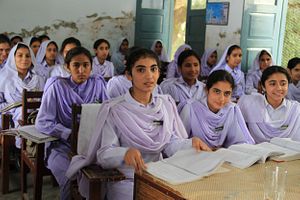On 16 December, 2014, a school siege in Peshawar resulted in the killing of 141 people, of which 132 were children. The world mourned the devastation and sitting thousands of miles away in Canada, Zaki Patel tried to understand the chaos that had pervaded the nation. From his vantage point, the intensity of the damage just seemed impalpable. As he followed the news, he came across a tweet that said: build 141 schools, each in the name of a child that died. That inspirational moment is still fresh in Patel’s mind; it sparked 141schools.org‘s mission to eradicate ignorance and extremism in Pakistan through education.
Zaki Patel is working on the 141schools.org movement with his wife and co-founder Syeda Zaki. Originally from Karachi, the couple is settled in Canada. Patel is a computer science graduate of McGill University and works in tech while Zaki had a finance background but made the transition to social entrepreneurship a while ago.
The founders have a vision of building schools in Pakistan, and each school is planned to be dedicated to those who died in the Peshawar school terrorist attack. But a plan of such magnitude needed some assistance. Patel and Zaki collaborated with The Citizens Foundation (TCF) to develop and implement a strategic plan to build these schools and the joint partnership led to “141 Schools For Peace.” TCF is one Pakistan’s leading educational non-profits that builds schools for underprivileged children, and all TCF initiated schools are located in urban slums and in Pakistan’s poor rural areas. TCF schools also promote a co-education system with a balanced gender ratio. In most of their schools, girls comprise at least 50 percent of the student body. Sharmeen Obaid-Chinoy made a documentary on TCF that outlined the organization’s cause.
The Diplomat spoke with the founders of 141schools.org to learn more about the development of this project:
The Internet acted as a catalyst for your initiative. Please tell us about the response and the impact. Are the number of supporters increasing?
Syeda Zaki: The catalyst for our initiative was the Peshawar Attack, but the web definitely played a pivotal role in getting the word out. The Peshawar school attack and the killing of children was a global major event–a catastrophe–and people had gathered online to voice their opinions and to share their grief. People wanted to participate. Zaki, being the web developer, set up a simple website and asked people to sign up; the feedback was great. During the first three days, 15,000 people from all over the world signed up and pledged support. People regularly send us emails asking for information and the number of people signing up is consistently increasing.
Which region has contributed the most towards 141 Schools for Peace?
Syeda Zaki: TCF USA was at the forefront; there was a pledge for two schools within the first few days of launching this initiative. At this point, we can’t publicize who the donors are, but traditionally TCF USA is the largest donor of TCF Pakistan.
Which cities/areas are the schools going to be built in?
Zaki Patel: TCF has a list of locations outlined in their plan and so 141 Schools for Peace will be built across Pakistan wherever there is need for a school, depending on the ratio of students and teachers and the availability of land.
What amount is required to build the schools?
Zaki Patel: The standard average cost of a school (either primary or secondary) is around PKR 20.7 million (approximately $207,000). This includes the cost to operate the school for three years (PKR 5 million, approx. $50,000). At times, the cost varies depending on the size of the school and availability of land. We are currently raising funds for the sixth school, and we want to keep the momentum going by spreading awareness while TCF works on the construction of schools.
Who is going to manage these schools once they are built?
Zaki Patel: TCF schools are operated by their management and organization. 141 Schools for Peace will also be managed by TCF because we don’t have any background in school building or school management, and it’s hard overseeing the construction because we are based in Canada.
When is the first school expected to open?
Zaki Patel: The first school will be completed in the summer of 2016. TCF opens about 40 to 60 schools each year, so they already have a strategic plan that they follow for the completion of each school.

































